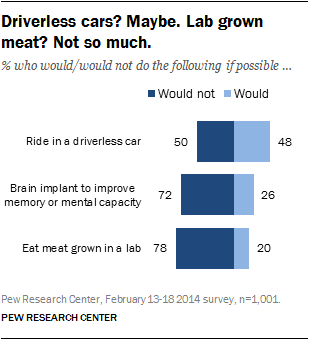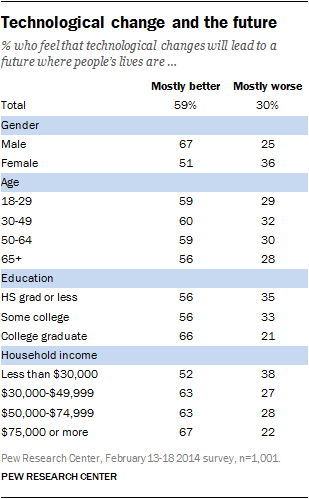Research Reveals Americans’ Feelings About Futuristic Technology
This article is more than 2 years old
 I teach, think, and write a lot about the technology of the future, and the implications of that technology. I often worry that people accept the evils of technology without thinking carefully enough about it — i.e., spying, other privacy invasions, and hacking — and that Aldous Huxley’s fear that we’ll be “caught by surprise by our advancing technology” will indeed come to fruition. But recent Pew research indicates that Americans might be a little more skeptical about futuristic technology than I thought.
I teach, think, and write a lot about the technology of the future, and the implications of that technology. I often worry that people accept the evils of technology without thinking carefully enough about it — i.e., spying, other privacy invasions, and hacking — and that Aldous Huxley’s fear that we’ll be “caught by surprise by our advancing technology” will indeed come to fruition. But recent Pew research indicates that Americans might be a little more skeptical about futuristic technology than I thought.
Just as we’ve experienced great technological leaps in the past few decades, we’ll continue to advance technologically at breakneck, if not exponential, speed. The Pew Research Center wanted to see how Americans feel about what’s coming down the pike, and what technologies they predict will actually come to fruition in the next 50 years. Their research shows that 59% of respondents believe the coming technology will impact society in a positive way. I’m not sure if that number indicates optimism or naivete, or perhaps a little bit of both. Thirty percent of respondents think the coming technological changes will make life worse. Are they pessimists or Luddites? Maybe a bit of both.

The folks who responded more optimistically also tended to believe that certain technologies will come to fruition in the next half-century. Eighty-one percent believe custom-grown organs will become a reality. Half of the respondents believe in machines’ abilities to create art as well as humans can. Thirty-nine percent believe that the teleportation of objects is on the horizon (I wish!), and 33% believe humans will have extended their reach to other planets. Nineteen percent think we’ll be able to control the weather. I think El Nino would disagree.
The study reveals some concerns, too. Sixty-six percent of respondents don’t support the “designer baby” trend, allowing parents to genetically create “better” (faster, taller, smarter, etc.) kids. Sixty-five percent of people don’t want robots taking care of grandma (though they don’t say whether they’re okay with robots hanging out with her). Despite the convenience, 63% would rather not have personal and commercial drones buzzing around (this triathlon competitor would agree, I’m sure). Fifty-three percent of people would rather people not wear Google Glass or other devices that feed them information about their environments; most of those respondents were women. It does appear that gender and education contributed to the responses — men were generally more optimistic; men with college degrees were the most optimistic of all.

People were divided about driverless cars, but a number of respondents said that they’d like flying cars, bikes, or personal space crafts. People also responded favorably to time travel and radical life extension. Eleven percent of people said they either weren’t interested in these futuristic inventions or they were perfectly happy with what’s currently available to them. Huh. That’s not something you hear very often.












